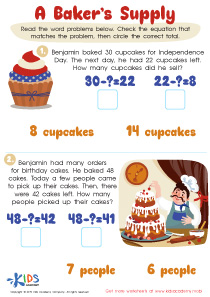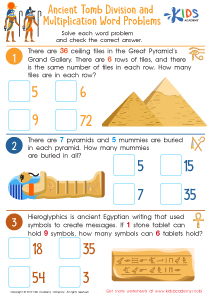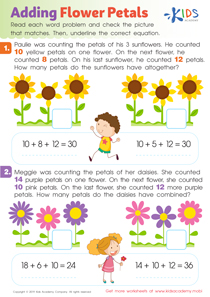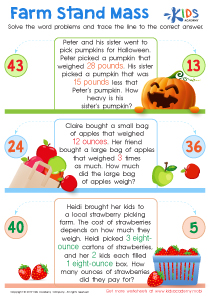Time Word Problems Worksheets for 4-Year-Olds
1 filtered results
-
From - To
Introducing our Time Word Problems worksheets, expertly crafted for four-year-olds stepping into the world of learning. These school downloadable worksheets are designed to introduce the essential concept of time through engaging and straightforward problems tailored for young learners. Each worksheet combines colorful visuals and simple, age-appropriate challenges that make learning both fun and effective. Ideal for home or classroom use, these worksheets help build a solid foundation in understanding and managing time early on. Equip your child with the skills to excel with our thoughtfully developed educational resources. Start their journey of learning with confidence and curiosity!
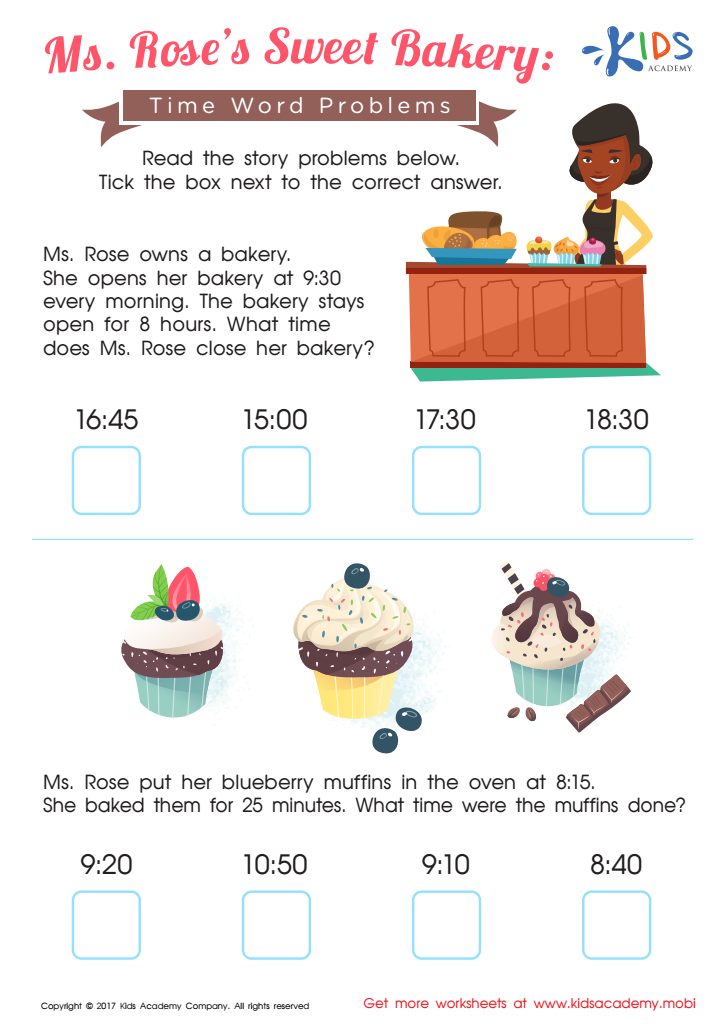

Ms. Roseв's Sweet Bakery Time Worksheet
The Importance of Time Word Problem Worksheets for Four-Year-Olds
As children enter the exciting world of learning, one of the foundational skills they begin to explore is the concept of time. Time management is not only essential for daily routines but also a critical academic and life skill. For four-year-old children, understanding time involves more than just reading clocks; it involves comprehending the sequence of events, durations, and the practical implications of time in their daily lives. This is where specially designed worksheets on time word problems, often included in school homework sheets, play a pivotal role.
Enhancing Cognitive Development
Worksheets focused on time word problems are excellent tools for enhancing young learners’ cognitive development. They encourage children to think critically and apply logical reasoning to solve problems. By presenting scenarios where children must determine the duration between activities or figure out start and end times, these worksheets help develop essential problem-solving skills. For instance, a worksheet might ask, "If you started eating lunch at 12:00 and finished at 12:30, how long did you take to eat your lunch?" This encourages children to think about time in a structured way.
Building Mathematical Foundations
Time word problems are not just about learning to tell time; they are intricately linked with mathematical concepts. These problems help children grasp the idea of numbers, counting, and eventually, addition and subtraction. For example, figuring out how many hours are left until a birthday party starts involves basic subtraction skills. School homework sheets that include these types of questions support the early mathematical curriculum and prepare children for more complex concepts as they advance in their education.
Supporting Routine and Time Management
For four-year-olds, daily routines provide a sense of security and control. Time word problems on worksheets can relate directly to their daily activities, such as their school schedule, playtime, or bedtime. This not only makes the worksheet relatable and engaging but also teaches them the importance of time management. Understanding how long each activity takes helps children develop a sense of time, aiding them in becoming more organized and punctual from an early age.
Enhancing Language Skills
Time word problems also inadvertently support language development. As children read and comprehend the problems posed, they improve their vocabulary and language comprehension skills. The description in word problems helps them visualize scenarios and understand the context, which is a critical aspect of language learning. This dual benefit makes these worksheets an invaluable educational tool.
Promoting Real-World Application
One of the most significant advantages of incorporating time word problems into school homework sheets for young learners is the promotion of real-world application. By connecting abstract concepts of time with everyday activities, children learn to see the relevance of what they are learning in their own lives. For instance, a worksheet might pose a question such as, "If a television show begins at 3 PM and lasts for half an hour, what time does it end?" This type of question helps children connect the lessons on time with real-life events, enhancing their understanding and retention of the concept.
Encouraging Parental Involvement
Additionally, these worksheets offer an excellent opportunity for parental involvement in their child's early education. When children work on homework sheets at home, parents can participate and help explain the concepts, which can lead to meaningful family interactions centered around learning. This interaction not only reinforces the learning process but also strengthens the bond between the child and parents, making learning a shared, enjoyable experience.
Building Confidence and Independence
As children successfully solve time word problems, their confidence in handling similar problems in real-life situations is boosted. This increase in confidence can lead them to be more independent in their activities and decisions. For example, understanding how long a task takes can help a child decide if they have enough time to play before dinner. This fosters a sense of responsibility and decision-making skills from a young age.
Conclusion
Overall, worksheets on Time Word Problems are a fundamental tool in shaping the educational foundation of four-year-olds. They not only strengthen cognitive and mathematical skills but also facilitate real-world connections, language development, and personal growth in young learners. By integrating these worksheets into school homework sheets, educators and parents can provide children with a robust start in their educational journey, preparing them for success both in school and in everyday life. As such, time word problems are more than just academic exercises; they are building blocks for lifelong learning and development.
 Assign to the classroom
Assign to the classroom






